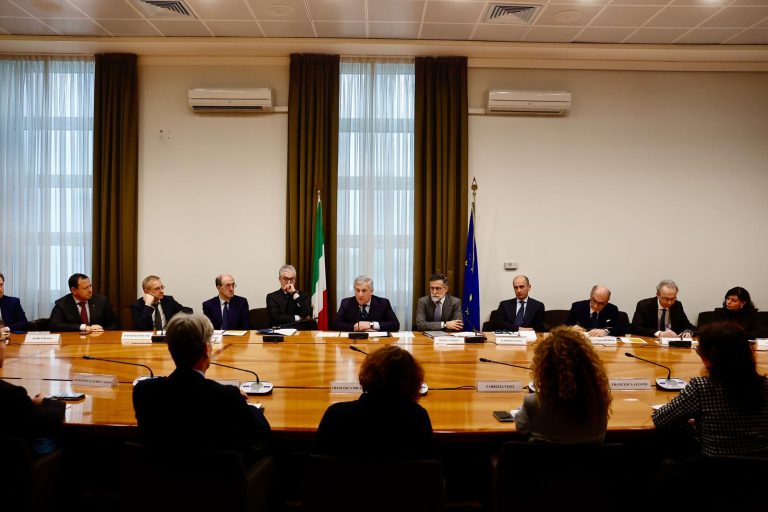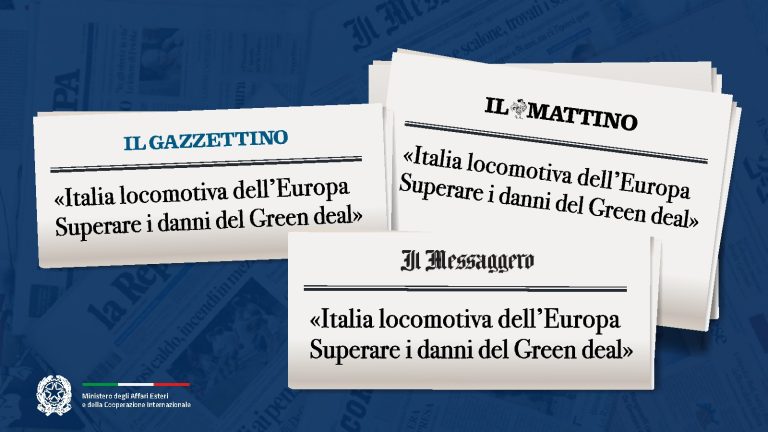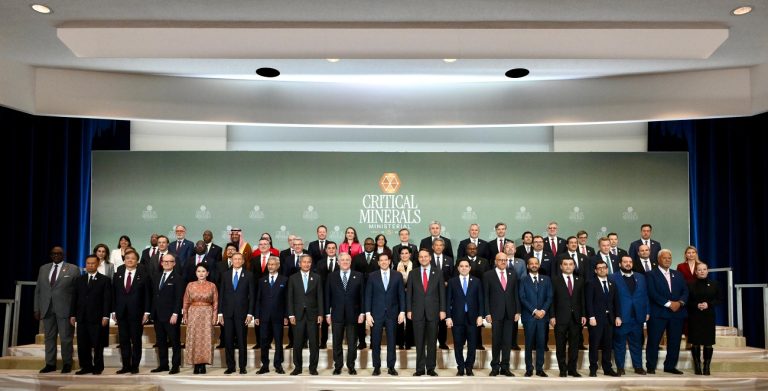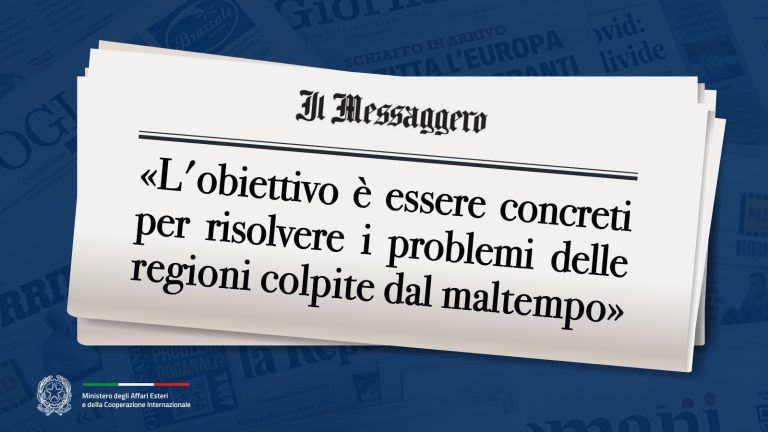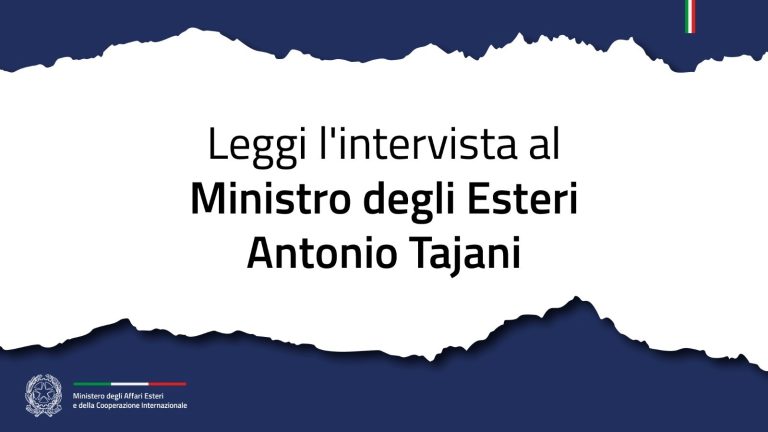Fiscal stability and greater rigour on spending: the high public debt does not allow the government to take risks. Deputy Prime Minister and Foreign Minister Antonio Tajani makes it clear: we need to fight debt, not look the other way. This is his view on the economic dossiers of the government, which is committed to finding a final agreement in the majority for the measures of the Stability Law. With a proposal to privatize public assets, through the creation of a specific Fund. He also announced that a National Conference on Exports has been convened for 5 December, which will be attended by companies, the diplomatic network and the various government agencies dedicated to internationalization.
Minister Tajani, let us start with the forecast on the EU growth, which is confirmed to be slowing.
« The Commission estimates that this year we will grow by 0.7 percent and next year by 0.9 percent. The government estimated 0.8% and 1.2%, respectively. The figures do not differ much. I want to point out that despite a difficult situation, with two wars at our doorstep, inflation and rising interest rates, our economy is holding up well and is not going into recession. This is thanks to the government’s work on fiscal stability, as confirmed by the good rating of three rating agencies, which I hope will be followed by Moody’s rating that is expected for today».
Over the past year you have repeatedly criticized the ECB’s policy on raising rates.
«The spread remains below 200 points. The increase in yields on government bonds is due to the ECB’s rate hike. I welcome the Central Bank’s recent decision not to further raise rates. Inflation, which is mainly caused by external factors, is falling and we are achieving the dual goal of fiscal stability and avoiding recession».
What do you expect for the ESM? Italy is the only country that has not approved it, an anomaly especially for a pro-European party like Forza Italia.
«It will be discussed after the adoption of the Stability and Growth Pact, or rather Growth and Stability Pact».
On some points the budget package is still under discussion. Forza Italia has raised the issue of the Superbonus tax credit, the increase of the so called cedolare secca (a flat rate tax on rental income) and the abolition of the Ace (Aid for Economic Growth).
«It is normal that in a democracy the ruling parties discuss the most important law which – I remind you – shall be adopted by Parliament by the end of the year. We have defined the amounts of the package and the intervention areas, which will not change. Italian citizens, our European partners, and the markets know that we are a serious and responsible government and that our priorities are growth and fiscal stability. Our European partners and the markets appreciate the fact that we are a government that focuses on growth and fiscal stability».
On several occasions within the government you and your party had different positions.
«Yes, it is true. Sometimes even with harsh discussions, but always safeguarding the country’s interest, as in the case of banking stability. And without forgetting those who are most in need: 19 of the 24 billion in the budget package are used to cut the tax wedge on low wages, and to invest in healthcare, in renewing public contracts and in supporting families. We must also add the nearly 5 billion in tax cuts through the reform of the low rates of IRPEF (the personal income tax). Minimum pensions will also increase. Unfortunately, our high debt restrains spending possibilities. We cannot afford to take budgetary risks. Those who would like the State to do anything and everything must realize that, in addition to the huge debt, Italian public spending already exceeds 1 trillion, equal to 52 percent of GDP. It is therefore not true that the State does not spend. Maybe we should ask ourselves how it spends».
Minister, this year Italy’s economic growth is back to almost “zero”…
«Growth helps us on debt. In this context, however, it is a moral duty, as well as a matter of economic expediency, to improve the quality of public spending. We cannot increase our debt by leaving unbearable fiscal burdens on the future generations’ shoulders. Public spending must be efficient, as well as lead to growth, and services for citizens, not to a waste of resources. We must revise the maze of incentives, disincentives, laws and regulations that lead to small and often unnecessary expenses which, however, put together make big expenditure. Our education system must know how to offer prospects for young people, taking into account a rapidly changing world».
The young people growing in a country experiencing a demographic decline and gradual aging of population.
«We have to deal as much with a significant demographic decline as with Artificial Intelligence, which will change many of our jobs and professions. Healthcare needs to be improved, and we probably need to invest better and more, but rationally and keeping the territories’ needs in mind. Excessively long waiting lists for specialist medical services are unacceptable. With this financial package we have committed significant resources to solve this problem».
Let us now focus on privatizations. The government’s goal is ambitious: 20 billion in proceeds.
«We have huge public assets, worth 1.8 trillion. They need to be redeveloped, put to good use and, where not needed, enhanced and not sold off. It is not possible to have empty buildings and pay lavish rents for other buildings. According to the Finance Ministry, the value of “transferrable” real estate amounts to about 300 billion. I am thinking of a Public Property Privatization Fund that – also considering past, not-so-successful experiences – has simple administrative procedures, can securitize and sees the active participation of Cassa Depositi e Prestiti (Savings and Loans Bank)».
There is the huge issue of reforming the tax system, etc.
«The State has to recover efficiency in every area, ranging from justice to taxation, the Public Administration, etc. Ninety-seven percent of our tax revenue comes from only 16 of the more than 100 taxes we have. Too many unnecessary micro-taxes that only create endless red tape. A company can spend up to 312 hours a year on paperwork and administrative procedures. The State must enact good laws, provide efficient administration and fight against fraud and unfair competition. It must be friendly to citizens and companies, with simple and non-burdensome rules, as well as non-oppressive taxation».
Companies, especially small and medium-sized ones, are calling for more attention to their activities.
«Structural growth, which has been lacking in Italy for more than 20 years, can only take place with private initiatives, which must be put in a position to invest and grow. Companies are our real economic engine, as evidenced by the over 600 billion in exports. By income generated we are the second largest European manufacturing country behind Germany. By production diversification we are the second largest manufacturing country in the world behind China. Everyone wants “Made in Italy” products. It is up to us to produce and export these products. As Foreign Minister, I work to strengthen our economic diplomacy for this purpose. I have decided to convene a National Conference on Exports on 5 December, where – together with all our companies, from the smallest to the largest ones – we will find the best strategies to export even more».
The message often comes from the business community that a systematic industrial policy is lacking.
«When I was European Commissioner, I fought for an effective industrial policy. I think it is needed today more than ever in Italy and in Europe. A modern industrial policy that is capable of attracting investment and ensure that the 1.8 trillion euros of savings held in our current accounts leave the banks and go to finance a stronger real economy, with the South of Italy as a key player in this economic-entrepreneurial relaunch. We need better logistics, starting with ports, as well as attention to small and large companies, to the automotive, mechanical engineering, and energy-intensive sectors, just to name a few. But also to agriculture, trade, crafts and the professions. Invest, innovate and enhance our strengths»
Creating good and lasting jobs is the priority goal of every government.
«Employment in Italy is growing despite the current economic slowdown. We have the highest level of employment ever, over 60 percent. But we are still far from the European average of 75 percent, especially for women and in the South of Italy. Only in this way can we ensure higher wages. I am still convinced that the minimum wage should be ensured by national collective agreements and not imposed by law. If anything, compliance with national collective agreements should be enforced by law for those that do not abide by them. This makes companies and trade unions more responsible»
Broad swaths of workers have very low wages given the cost of living
«But the real problem of our low wages is solved neither by laws nor by taxation. It is solved by sound companies that can afford to pay high wages. In Italy these companies fortunately exist and I wish to thank them for what they are doing. This is where we have to start, with interest rates coming down and the support of a banking world ready to finance this pillar of the new Italian miracle».
The international situation is dire: two wars with the risk of a possible widening of the conflict in the Middle East
«We face huge challenges, ranging from wars on our doorstep, to energy supply, to green and digital transitions, to immigration management, to the risk of new pandemics or major natural disasters. These are challenges we cannot face alone. That is the reason why we are playing an active role within the European Union. We cannot fund joint actions on defence, health or climate change with national budgets alone. For rising up to these challenges we need European instruments and flexibility in the new Stability and Growth Pact – and I wish to underline growth – that enables us to make joint investment without any excessive burdens or penalizations».
Just a few months to go before the next European elections, and today’s equilibria could change.
«With the European People’s Party, Europe’s leading political force, we want a pragmatic, non-ideological approach to the necessary green transition, to avoid European industrial desertification and declining agricultural production, as well as a pragmatic approach to the new regulations on packaging and the circular economy, which will be voted next week by the European Parliament plenary meeting in Strasbourg, and which is of particular interest to the leading Italian companies in the sector. We are pushing for a tax on web giants, for gender equality, and for youth and innovation».
Since the beginning of the war in Ukraine, Italy has managed to quickly diversify much of its energy supplies. Energy remains a crucial need for the entire Italian system.
«The government believes that the possibility of making Southern Italy an energy hub for Europe is concrete, and we will move in this direction. Nevertheless, I want to say one thing clearly: we cannot give up, and indeed we must continue to explore the field of nuclear energy. Minister Gilberto Pichetto Fratin is working concretely on the National Platform for Sustainable Nuclear Power. The goal is to keep Italy in the field of research and experimentation. In 8-10 years we will have the first ‘small modular reactors’».
Is this therefore a new road that will be taken?
«We are not talking about new nuclear power plants but about small modular reactors capable of producing up to 500 megawatts of electrical power. We need to follow the results of research in this field. The ultimate goal is decarbonization, and nuclear power, as well as gas, have been included in the European Taxonomy list of economic activities deemed sustainable. As a government we have confirmed that we want to cut greenhouse gas emissions by 55 percent by 2030 and to achieve climate neutrality by 2050, but the path to these goals is for us to decide, also because the characteristics of Italian buildings are quite different from those of other Member States».

